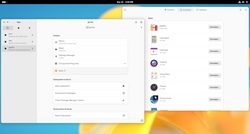Vanilla OS 2: an immutable distribution to run all software
Vanilla OS, an immutable desktop Linux distribution designed for developers and advanced users, has recently published its 2.0 "Orchid" release. Previously based on Ubuntu, Vanilla OS has now shifted to Debian unstable ("sid"). The release has made it easier to install software from other distributions' package repositories, and it is now theoretically possible to install and run Android applications as well.
The idea behind Vanilla OS is to maintain a small, immutable core operating system while isolating additional software from that core through containerization or sandboxing. The core of Vanilla OS is based on Open Container Initiative (OCI) images composed of packages from Debian sid. These images are updated and managed by the ABRoot utility. Rather than handling system updates through a package manager, Vanilla OS downloads a new OCI image, and then uses the new image when it reboots. This is similar to other image-based operating systems, like Aeon and Bluefin that use A/B image update strategies—though each distribution has its own method of doing so. All of this happens under the hood, so users don't have to be aware of how updates work.
update
Newer LWN article:
-
Vanilla OS 2 - future plans, updates, and next release
The Vanilla OS project has published a blog post to answer questions that users have raised since the release of Vanilla OS 2. The post has information about the update strategy for the distribution, an enterprise version with support, and plans for an experimental version called Vanilla OS Vision.
We are not planning for a potential Vanilla OS 3 because it is not yet necessary. As previously explained, our focus right now is on bug fixing and making the system as solid as possible, especially in light of collaborations with OEMs. We're all excited about laying the foundation for a third version of Vanilla OS, but we have responsibilities to attend to first.
This does not mean that there will never be one, nor does it mean that Orchid will become stagnant. On the contrary, as previously mentioned, our updates not only bring fixes but also updates to system components, improvements to existing features, and updates to components like GNOME (we are planning the release of GNOME 47 soon, for example).

